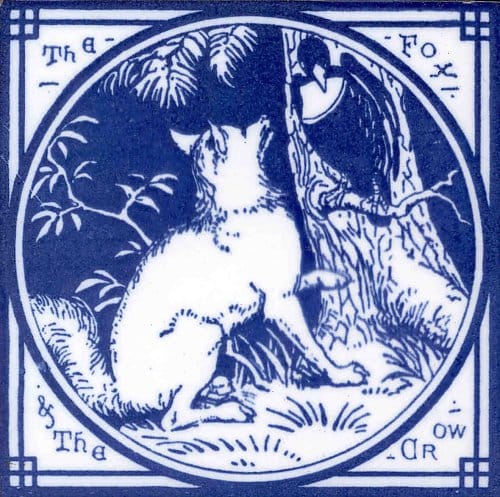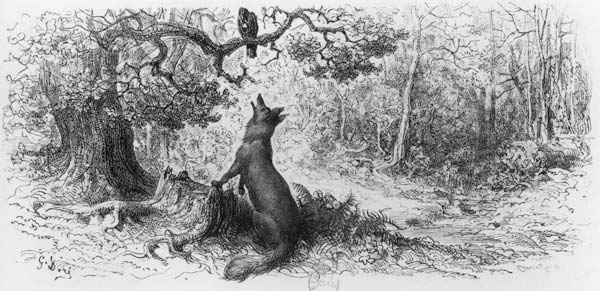Le Corbeau et le Renard…..by Jean de La Fontaine
Le Corbeau et le Renard, one of La Fontaine’s most famous fables, is very similar to Aesop’s fable about the crow and the fox. His fables usually end (or start) with une morale, the moral of the story. Here, the moral comes from the fox: “Mon bon monsieur, apprenez que tout flatteur vit aux dépens de celui qui l’écoute.” (You should learn that all flatterers live off those who listen)

Maître Corbeau, sur un arbre perché,
Tenait en son bec un fromage.
Maître Renard, par l’odeur alléché,
Lui tint à peu près ce langage:
“Hé! bonjour, Monsieur du Corbeau.
Que vous êtes joli! que vous me semblez beau!
Sans mentir, si votre ramage
Se rapporte à votre plumage,
Vous êtes le phénix des hôtes de ces bois.”
A ces mots le Corbeau ne se sent pas de joie;
Et pour montrer sa belle voix,
Il ouvre un large bec, laisse tomber sa proie.
Le renard s’en saisit, et dit: “Mon bon Monsieur,
Apprenez que tout flatteur
Vit aux dépens de celui qui l’écoute:
Cette leçon vaut bien un fromage, sans doute.”
Le Corbeau, honteux et confus,
Jura, mais un peu tard, qu’on ne n’y prendrait plus
The Crow and the Fox
At the top of a tree perched Master Crow;
In his beak he was holding a cheese.
Drawn by the smell, Master Fox spoke, below.
The words, more or less, were these:
“Hey, now, Sir Crow! Good day, good day!
How very handsome you do look, how grandly distingué!
No lie, if those songs you sing
Match the plumage of your wing,
You’re the phoenix of these woods, our choice.”
Hearing this, the Crow was all rapture and wonder.
To show off his handsome voice,
He opened beak wide and let go of his plunder.
The Fox snapped it up and then said, “My Good Sir,
Learn that each flatterer
Lives at the cost of those who heed.
This lesson is well worth the cheese, indeed.”
The Crow, ashamed and sick,
Swore, a bit late, not to fall again for that trick


